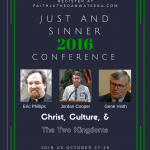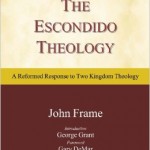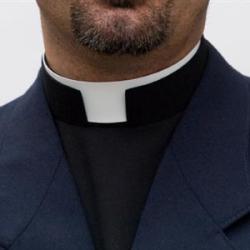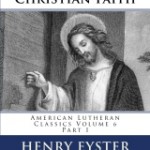
First of all, happy day after Reformation Day. Semper reformanda!
Not too long ago, my eleven-year-old son and I were attending a different LC-MS (Lutheran Church Missouri Synod) congregation than the one that we are members of. After the confession and absolution, I looked at my son, who was already looking at me in great seriousness, repeating as a question the first words the pastor had said in his unique absolution: “God always looks for the best in his children?”
I confirmed he was right to be taken aback. Later on, without any prompting from me, he would inform my wife that “that church teaches false doctrine”.
Extreme? No. My son, thanks be to God, knows his stuff.
In the throes of the Reformation, Martin Luther fought vigorously against the idea that there was anything good in man that would merit God’s justifying word. Even sincere repentance was not a “good work” that somehow earned God’s approval, and His subsequent granting of real forgiveness and peace to His child. No. God comes only for sinners, and for this reason the doctrine of justification must be asserted and upheld! The absolution that He grants to the sinner, received in repentant faith, is given because He is good.
Here, we are passive in the reception the gifts of grace won for us in Jesus Christ. In one of Luther’s most vigorous battles to uphold this doctrine of justification – versus the famous humanist Erasmus – he even penned the following words, highlighting our passivity:
“A sword contributes nothing whatever to its motion but is entirely passive; however, in inflicting the wound it has through it motion co-operated with him who yielded it. Therefore just as a sword does not co-operate toward setting itself in motion, so the will does not co-operate towards its willing. This willing is a motion which the divine Word produces. It is merely something that is done to the will.”

Some 13 years later, in his “antinomian disputations,” Luther would make it especially clear that the Christian, in sanctification, co-operates in a way with God that is conscious and active. The Christian is, in part, called into “lifelong military service and battle array” to expel sin against God’s law in them more and more. Of course, while in the world this “active justification” is imperfect, God nevertheless finds it praiseworthy.[i]
All of this only makes sense because Luther, unlike John Calvin, believed that a person who was really and truly a Christian, in their actions following from justification, could lose their faith due to sin (see here). If Luther meant to assert that man’s will was always and only supposed to be passive – and not passive primarily when it came to receiving His Word of forgiveness – we would have to conclude that God intended any sin on man’s part. Further, it would seem this would imply that God never intended Adam to resist sin before the fall – something which clearly goes against the thrust of the biblical text!
In his zeal to defend the doctrine of justification, another one of Martin Luther’s students, Matthias Flacius, went in just this direction. He did not, like Luther, teach that man’s nature was good but fatally infected by sin – he ended up teaching that man’s nature was sin itself (see an answer to one of my non-Christian students about this thing here). Here, avoiding the errors of both Flacius and Phillip Melanchton, the “second Martin”, Martin Chemnitz, would seek to offer the correct way of seeing both justification and sanctification, which the 1580 Book of Concord called the two kinds of righteousness. In his Loci theologici, he laid out the following:
“This teaching concerning the freedom of the new creature must be carefully taught: (1) in order that we might learn to recognize what and how great is the blessing of renewal; (2) in order that no one may forfeit the grace of God, Heb. 12:15; (3) so that we not grieve the Holy Spirit, who wants to help us. For Paul exhorts the Corinthians to this goal in 2 Cor. 6:1, “Do not receive the grace of God in vain.” But we must always add that this liberty is not complete, for His “strength is made perfect in weakness,” 2 Cor. 12:9.
Further, if anyone asks whether in a general sense the will is purely passive or active, Augustine has answered beautifully, De Corrept. et Grat., 2 [MPL 44.918], “If they are the sons of God, they will understand that they are led by the Spirit of God and will do what must be done; and when they have done it, they will give thanks to Him by whom they are led. For they are led in order that they might do something, not in order that they might do nothing.” Paul speaks the same way in 1 Cor. 15:10, “I labored more than all; yet not I, but the grace of God which is with me,” and 2 Cor. 13:3, “You seek a proof of the Christ who speaks in me.” (all bold here and below mine)
One notes here that Chemnitz, in talking about the new creature’s active will, is assuming that one is already a Christian. While it is not clear from this passage, this means that the Christian, who is active, is also one who may be at rest – i.e. one who is at peace with God. This is the security that the Christian has that the doctrine of justification is meant to uphold and safeguard. Chemnitz goes on:
The second point is that change or renewal is not the kind of change which is completed or accomplished at one moment, immediately and in all its aspects. Rather it has its beginning, and its various steps by which in great weakness it is brought to completion. Therefore we must not think that I shall wait with a secure and idle will until—by the operation of the Holy Spirit in definite stages and with no activity on my part—the renewal or change will have taken place. For the fact is that it is impossible to show at some mathematical point where the freed will begins to function. But when prevenient grace, that is, the first beginnings of faith and conversion are given to a man, immediately the battle between the flesh and the Spirit begins and it is manifest that this struggle does not take place without any action of our will. For the Holy Spirit who dwelt in Moses fought in a different way while he was still alive contending against his flesh, than Michael fought with the devil for the dead body of Moses, Jude 9. Likewise, in the beginning the desire is very weak, the assent is not strong, the obedience is tenuous, and these gifts must increase. And they do increase in us, not in the way that a log is moved forward with violent force, nor in the way that lilies grow which neither labor nor care; but by trying, struggling, seeking, praying, striving; and this is not of ourselves, but it is the gift of God. Cf. Luke 19:13, where the nobleman turned over to his servants the talents and said to them, “Trade with this until I come.” In Matt. 25:26 he does not say, “Hide it away in the ground.” And Paul uses a most illustrative word in 2 Tim. 1:6, where he says, “I exhort that you stir up the gift of God which is in you.”

Here one also needs to note what is going on with Chemnitz’s use of “prevenient grace”. He is not using this term to describe a grace that, over time, eventually makes one into a Christian. Rather, this grace is the first beginnings of real saving faith which then continues to mature the Christian. One also notices how Chemnitz, aware of issues that came to the fore after Luther’s death, avoids language similar to the Reformer’s (i.e. in reference to the sword) above.
The things which have been said about prevenient, preparatory, and operating grace have this meaning, that the initial stages in conversion are not ours, but God—through the Word and divine inspiration—goes before us, moves and impels our Will. After this movement of the will has been accomplished by divine power, then the human will is not purely passive, but, moved and aided by the Holy Spirit, it ceases to resist and assents and is co-operative (synergos) with God, etc. There is a similar statement in Augustine’s De Dogm. Eccles., ch. 32 [MPL 58.893], “God works in us so that we will and do what He wills; nor does He permit that the gifts which He has given us lie idle in us, but rather they must be used, and not neglected. Thus we are both co-operators with the grace of God, and if we see anything in ourselves and of our own power which is becoming weak because of our letting down, we will dutifully take refuge in Him who heals all our weaknesses and has commanded us to pray, ‘Lead us not into temptation.’ ”
Chemnitz appears to be saying that man both passively and actively consents to the goodness of God – passively in terms of receiving His gifts of love and grace, and actively as well – perhaps, for example, in that we at times more actively and consciously receive the “good works… prepared beforehand” that His “poems” (ποίημα) should walk in them (Eph. 2:10). One notes that by definition, any notion of consent means that you are not acting alone, but with another, responding to another.
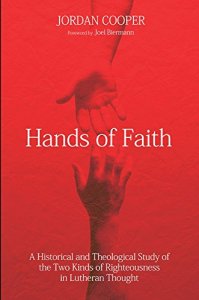
And all of this syncs with what we and the 1580 “Formula of Concord” (in the Book of Concord) calls the “two kinds of righteousness”. As Pastor Cooper puts it in his new book Hands of Faith: a Historical and Theological Study of the Two Kinds of Righteousness in Lutheran Thought, those who followed Luther – all the way up until the 20th century – also showed that:
“The two kinds of righteousness are described as the twofold effect of faith, whereby one is receptive before God and active in the world. This also corresponds to the distinction between justification and sanctification. In justification, one receives the imputed righteousness of Christ, and in sanctification one receives Christ’s inherent righteousness. Hollaz has a similar distinction between monergistic operating grace and cooperating grace. There is also a distinction between the union of faith, wherein one is united with Christ as a mediator and receives his benefits, and divine indwelling wherein the Christian is changed and performs good works. All of these kinds of inherent righteousness are placed in contradistinction to the civil righteousness of the unbeliever, thus substantiating a distinction between three kinds of righteousness.” (p. 112, bold mine)
Back to Chemnitz. He goes on:
Furthermore, Augustine gives an illustrative example in the case of his own conversion, where we are permitted to see a living explanation of this question as to how, among the hidden sparks and weak beginnings of prevenient grace, the will is not idle but begins the struggle between the flesh and the Spirit. These points ought to be most noteworthy for each of us, not on the basis of idle arguments or irrelevant examples, but out of the serious penitential struggles of each person. But because many people live without any struggles of faith or prayer, they reach many confused conclusions about things of which they know nothing. Therefore a consideration of the conversion of Augustine will be useful. Chemnitz, M., & Preus, J. A. O. (1999). Loci theologici (electronic ed., pp. 248–249). St. Louis: Concordia Publishing House.
Now this kind of talk tends to make some Lutherans nervous as well. But here is where another great Lutheran – perhaps the greatest American Lutheran theologian – C.F.W. Walther, might be of some help in making things crystal clear. He spoke, for example, about how it is very easy to become a Christian but not to remain one! And in the ninth thesis of his famous Friday evening lectures (freely and eagerly attended by his students!) regarding Law and Gospel, Walther, bolstered by the knowledge of his own negative experiences with Lutheran pietism, put forth the following:
…the Word of God is not rightly divided when sinners who have been struck down and terrified by the Law are directed, not to the Word and the Sacraments, but to their own prayers and wrestlings with God in order that they may win their way into a state of grace; in other words, when they are told to keep on praying and struggling until they feel that God has received them into grace.
You can read more on this thesis and all of Walther’s fantastic thoughts on the topic for free here.
FIN
Images in public domain and from Wikipedia.
Notes:
[i] Those who don’t think Luther ever highlighted obedience should see his commentary on Deuteronomy (AE 9), and his discussion of the Ten Commandments in the Large Catechism. In addition, in 1519 Luther also expounded on the Lord’s prayer, and contrasting the new man in the Christian with the old Adam (“The old Adam is simply the evil leaning in us towards wrath, hatred, unchastity, greed, vainglory, pride, and the like.” [AE 42: 43]), Luther stated, for example, things like the following: “No matter how good our will may be, it is still immeasurably inferior to God’s will” ; “….this good will in us must be hindered for its own improvement.” ; “God’s only purpose in thwarting our good will is to make of it a better will” ; ultimately, he stated, man is to be “delivered from his own will, and knows nothing except that he waits upon the will of God” ; “Now that is what is meant by genuine obedience, a thing which, unfortunately, is entirely unknown in our day” ; “sure, he gave you a free will. But why do you want to make it your own will? Why not let it remain free?” and “A free will does not want its own way, but looks only to God’s will for direction. By so doing it then also remains free…” (AE 42: 47, 48).

